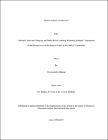Flipped-mastery learning through the use of 'student action cycles' in a mixed-ability secondary level Irish science classroom
Citation:
CLARKE, ROBERT, Flipped-mastery learning through the use of 'student action cycles' in a mixed-ability secondary level Irish science classroom, Trinity College Dublin.School of Education, 2020Download Item:
Abstract:
The following document explores the use of student action cycles (SACs), a reflexive, student-driven approach to flipped-mastery learning, with a focus on developing deep understanding rather than on learning to pass examinations, to address the learning intentions of the 2016 specifications for junior cycle science.
The views of students, with regard to their general educational experience, were examined through the use of several surveys, exit tickets and focus group discussions. In addition to this, comparisons were drawn with data from the Trends in International Mathematics and Science Study, (TIMSS). Science reasoning tasks, (SRTs), were used to examine the cognitive level of students, and the results from these were compared against those from Drumcondra reasoning tests, CAT-4, (cognitive ability test-4), and performance in English, mathematics and science junior certificate examinations. Mindset was also investigated, through the application of two instruments.
The results from this study detailed a fascinating picture, with regard to student experience, and provided a number of recommendations for improved practice. Diploma disease, the drive for accreditation, was observed to have an influence on both the depth of study, and the method of instruction preferred by students. Levels of cognition were found to have declined, in comparison to previous data, indicating that students? general level of processing of reality has deteriorated. Mindset, the belief as to whether intelligence and talent are fixed or malleable, was found to be a static trait, in direct contradiction of the established position. The syllabus for junior cycle science was revealed to be more favoured than its predecessor, the junior certificate science syllabus; although the terminal examination met with some criticism, when examined by leaving certificate students. The student action cycles, (SACs), that were central to this study were highly regarded, and shown to increase collaboration.
Author's Homepage:
https://tcdlocalportal.tcd.ie/pls/EnterApex/f?p=800:71:0::::P71_USERNAME:CLARKR11Description:
APPROVED
Author: CLARKE, ROBERT
Advisor:
Murphy, ColettePublisher:
Trinity College Dublin. School of Education. Discipline of EducationType of material:
ThesisAvailability:
Full text availableKeywords:
SOLO, Talk lessons, science, Vygotsky, junior cycle, mindset, intelligence, TIMSS, student action cycles, CASE, education, student distraction, real learning, student voice, junior cycle examination, learner empowerment, flow theory, diploma disease, ROSE, cognitive development, assessment for learning, assessment as learning, formative assessment, learning how to learn, science reasoning tasks, thinking science, student experience, attitudes towards science, flipped classroom, social constructivism, mastery learning, ways of learning, SAILS, post primary education, cooperation and collaboration, how I feel about school, curriculum content, motivation, concept cartoons, learning autonomy, feedbackLicences:
Related items
Showing items related by title, author, creator and subject.
-
Implementing an Integrated Web-Based Synchronous eLearning Collaboration Platform at Tertiary Level for Part-Time Mature Evening Students
Jennings, Audrey (Trinity College Dublin. Department of Computer Science, 2005-10)This thesis focuses on the lessons learned and new insights gained, from the pilot implementation of a webbased synchronous eLearning collaboration platform at Tertiary Level evaluated on part-time mature evening students. Over ... -
Culturally Relevant Pedagogy and Multi-Belief Learning: Exploring Students’ Experiences of and Perspectives on the Family Project in the GMGY Curriculum.
Malone, Tara (Marino Institute of Education, 2019-06)Irish classrooms are increasingly diverse in terms of cultures, languages, ethnicities and religions. Educators can engage with meaningful and relevant cultural elements from their students’ lives, and this can increase ... -
Collaborative, contextual, and technology-mediated mathematics learning activities : design heuristics and effects on student engagement
Bray, Aibhín (Trinity College (Dublin, Ireland). School of Computer Science & Statistics, 2015)This dissertation describes an approach to mathematics activity design that aligns the affordances of off-the-shelf technologies with relevant mathematics pedagogy. The aim is to create transformative learning experiences ...








